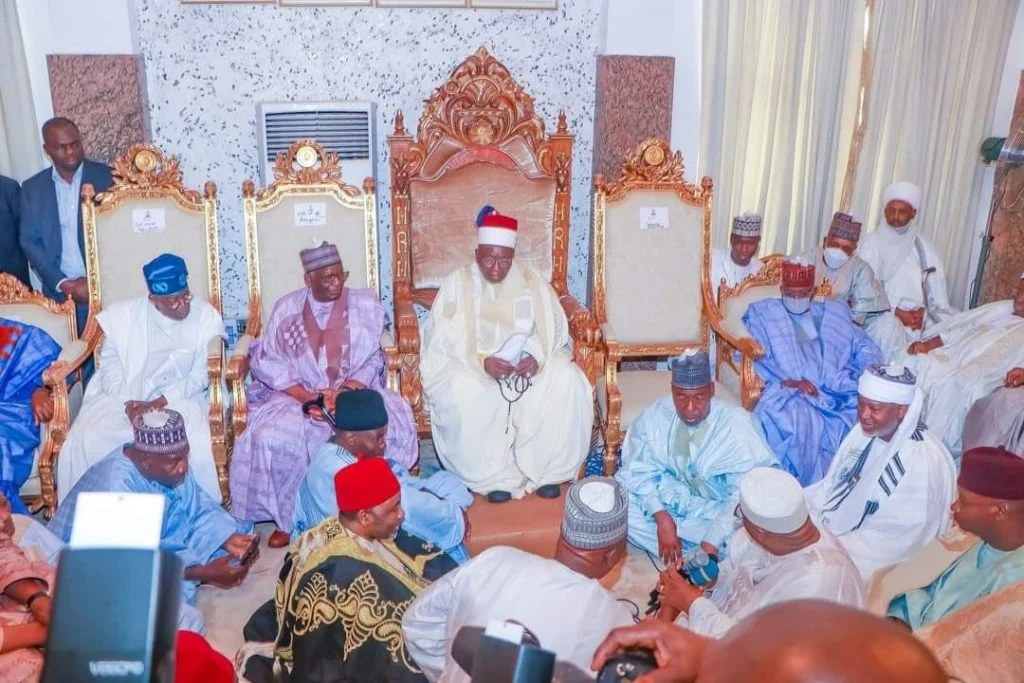Some commercial banks and filling stations have stopped collecting the old naira notes from customers, contrary to the ruling of the Supreme Court restraining the Federal Government from enforcing the February 10 time limit earlier fixed by the apex bank for the currency swap.
Findings by The PUNCH on Monday indicated that the banks refused to accept the old N1,000, N500 and N200 notes from depositors and point-of-service agents who flooded the bank to lodge their cash.
Point of service operators and other bank customers whose old naira notes were rejected, panicked as bank officials, who said they were acting on the Central Bank of Nigeria’s directive, remained adamant.
Also, lawyers and litigants at high courts in Lagos State were unable to file their court processes using the old naira notes for payment.
As the naira crisis worsened, the CBN Governor, Godwin Emefiele, again met with the President, Major General Muhammadu Buhari (retd.), at the Presidential Villa on Monday.
Emefiele, who had met with the President about six times since the naira crisis started, failed to address correspondents as he reportedly left the villa through a side entrance.
The governments of Kaduna, Kogi and Zamfara states on February 8 secured the order of the apex court extending the deadline beyond last Friday stipulated by the CBN for the use of the old notes.
A seven-member panel of the apex court, led by Justice John Okoro directed that the deadline be suspended till Wednesday when the proceedings would continue even as other states had applied to join the suit.
But our correspondent who visited the Mobil filling station at First Gate bus stop along Lagos-Badagry Expressway observed that the attendants refused to accept the old naira notes on Monday.
Checks also showed that banks in the Ikeja area of Lagos State refused to collect the old notes from customers.
Some frustrated and desperate customers were seen making frantic calls to their friends and loved ones intimating them of the development.
Speaking to The PUNCH on condition of anonymity because he was not authorised to speak on the latest development, a staff member of First Bank Plc said that they were instructed not to collect the old naira notes.
Our correspondent noticed that only customers who had new naira notes were allowed into the banking hall.
Also in the Badagry area of Lagos, several bank customers and PoS agents who visited banks on Monday were shocked to learn that the banks were not accepting the old notes.
A resident, who identified himself simply as Mr Julius said the branches of Access Bank and UBA in the town refused to accept the old currencies from depositors.
Speaking to our correspondent on the phone, he said, “What is happening in his country? My wife visited UBA only to be informed that the bank was no longer accepting the old notes. Some PoS agents who visited Access Bank were also informed that the bank was no longer accepting the old notes based on a directive from the CBN. I thought the Supreme Court ruled that the notes are still legal tender.’’
Ogun banks
A Sterling Bank official said banks in the Magboro area of Ogun State had shut down as a result of the scarcity of cash.
Findings also indicate that some banks in Abuja, the capital city, have stopped accepting the old notes.
Officials who spoke to our correspondent said the policy was in line with a directive from the apex bank, noting that they did not know anything about the Supreme Court order.
At a Zenith bank branch located in the Central Business District, customers who had the old notes could not deposit them as officials blatantly refused to accept them.
A bank official stated, “We are not collecting old notes again, the deadline was on Friday. The memo I saw yesterday (Sunday) directed that we should not collect N1,000 and N500 old notes anymore.
“We even had to dispatch all our old currency on Friday to the Central Bank. We obey our regulators, not the Supreme Court.”
At the GtBank close to the Ministry of Transport, our correspondent got the same response.
“We are no longer receiving the old notes, we are working with the CBN and anything they say is what we do,’’ a female cashier declared.
When reminded about the seven-day grace period announced by the CBN governor, she noted, “We don’t know anything about it, the deadline has elapsed, and we are working with the CBN.”
However, a UBA branch at the CBD, Abuja, allowed some customers to deposit their old notes.
A customer confessed that he had to call a senior official before he was allowed to deposit his old naira notes.
But the GTB and First Bank branches in the Jabi district flatly refused to accept the old notes.
The same situation was observed in Ado Ekiti, the Ekiti State capital as many residents were frustrated by the banks and filling stations which refused to collect the old notes.
Ironically, some filling stations also rejected cash transfers even though they did not provide PoS as they insisted on the new notes.
A bank customer, Tope Adeitan, said, “It was a hell of a day for me today. I was at a bank along Bank Road to make withdrawals, but I was told I could only withdraw N5,000 across the counter, which I did because I had no option. I could not say whether the bank was collecting old notes or not, but I did not see a single note of the old N200, N500 and N1000 with anybody throughout my stay in the bank.
“And at a petrol station, I had thought I would use my ATM card or my bank app to pay for fuel only to be told I would have to pay with the new notes. So, I had to use the money I collected from the bank. The petrol dealers are just interested in selling the new naira notes to PoS operators for a quick profit. I am confused, will I have to cough out N150 or N200 on every N1,000 I collect through PoS?”
Another bank customer, who identified herself simply as Ayomide, said she had gone to a bank branch in the Okeyinmi area to make a withdrawal but was surprised by the sea of people at the ATM points and under the makeshift tents who wanted to carry out transactions in the bank, adding, “I had to return home empty-handed.
Some people said that the bank and some others in the state capital rejected their old notes. So, I can tell you the banks are not accepting the old notes. The Federal Government needs to speak to Nigerians on this issue. This suffering is unbearable,” she said.
In Kwara State, checks by our correspondent revealed that several banks, including UBA, FCMB and Access bank refused to take the old notes from their customers on Monday while the Zenith Bank, First Bank and UBA at Unity Road did not load money into their ATM points.
But the Fidelity bank Keystone on Ibrahim Taiwo road, GTB, Unity road and Polaris on Murtala Mohammed road were besieged by anxious customers.
A customer, Abiola Adegoke who said he was at the Murtala Mohammed road branch of FCMB to lodge his company money said that the bank officials told him that there was an instruction from their head office that they should not receive the old naira notes from the customers.
Another customer, Mr Owolabi Azeez, explained that UBA rejected the old notes he wanted to deposit in his account.
Angry customers in Ondo State lamented the refusal of the banks to accept the old notes.
But some filling stations and supermarkets accepted PoS and electronic cash transfers during transactions.
A businessman, Mr Raphael Sunday, noted, “I went to my bank this (Monday) morning to deposit N55,000 old notes but it was rejected as the cashier told me that they didn’t collect old notes for now. I felt bad because there is nowhere I can take the money.The government should do something about this problem.”
However, a banker said they were not to blame for the situation, adding, “We are waiting for the directive from the CBN. If the CBN gives us a go-ahead, we would start receiving the old notes from the customers.”
Residents of Yola, Adamawa State, also complained that the banks had stopped accepting the old notes.
The development came on the heels of the circulation of defaced and mutilated naira notes.
Speaking on condition of anonymity, a CBN official said the notes issued by the CBN, though defaced and mutilated, were re-issued to cushion the scarcity of naira notes in the state.
He said, “To cushion the scarcity of naira notes, the CBN in Yola resorted to issuing to banks in the state damaged and defaced N50 denomination sourced from its dump vault where the notes have been designated for destruction.”
A PoS operator, Nguliaro Nicholas, said nearly 90 per cent of the currency in circulation in the state were mutilated N50 and N20 notes.
A UBA official revealed that the bank was collecting old notes earlier in the day but it received a directive from its headquarters to stop.
She said, “The CBN is quiet so we don’t know what we are into, so the measure from our bank is to reduce risk because the CBN has been quiet.”
A resident, Bamaiyi Yusuf, who travelled over 80km from Mayo-inne in the Fufore Local Government Area to the state capital to deposit N200,000 at the CBN because his bank (GTB) refused to collect the old naira notes, was close to tears when he was directed to return on Tuesday (today).
The CBN branch controller, Sanusi Sah, dismissed allegations that the issuance of the old notes by the banks in the state was meant to perpetrate fraud.
He also indicated the readiness of the bank to commence the naira swap based on official mail received from its head office.
Explaining why the filling stations were rejecting the old naira notes, the Secretary, the Independent Petroleum Marketers Association of Nigeria, Abuja-Suleja branch, Mohammed Shuaibu, said the banks were to blame for the development.
He stated that the banks had remained adamant, attributing this to the confusion caused by the CBN.
“The banks are still adamant. They said the CBN has not given them a directive on what to do. Before now, they said the CBN gave them a circular asking them not to collect the old notes from February 10, 2023,” he stated.
Shuaibu added, “But based on the Supreme Court judgment and the Council of State meeting, the CBN, as it is now, has not given the banks any other circular on whether to continue collecting the old notes or not.
“So this is creating confusion and people are afraid, because if you go to the banks, they won’t collect it from you, and if you collect the notes from the public, the banks will be adamant.”
It was, however, observed that most filling stations in the Federal Capital Territory had started using the Point of Sale machines, in accordance with the directive of the Federal Government.
Last week, the Federal Government through its Nigerian Midstream and Downstream Petroleum Regulatory Authority, ordered filling stations to accept PoS transactions as well as bank transfers from customers in order to ameliorate the effect of the cash crunch in Nigeria.
Reacting to the situation, the Association of Mobile Money and Bank Agents in Nigeria insisted that the banks must accept the old notes.
The National President, of the Association of Mobile Money and Bank Agents in Nigeria, Victor Olojo, who was indignant over the banks’ action asked the CBN to compel them to receive the old notes.
He said, “We are calling on the CBN to be more circumspect and they should also observe. They are dealing with Nigerians, we are in our country; we are not third-class citizens. The reality of the matter is that the currency swap has not been effective, it has not yielded any result. So if banks decide to say they are not collecting, it further affects the citizens.’’
Olojo cited the directive of the Kano State Government compelling banks in the state to continue to accept the old currencies.
He added, “The CBN should intervene and call on the bank to do the needful. You are aware that in Kano state and other places, commercial banks are compelled by the state government to work.
“In fact, small businesses that don’t collect old notes are being sanctioned by the state government. So the reality is that the cash swap is not effective, any further action by the CBN will affect the citizens. We are calling on the CBN to compel the banks to do the needful until we see meaningful results except we want are deceiving ourselves.
“We are not anywhere close to a successful cash swap programme in this country. Go to the market today, a lot of the old notes are still in circulation because there are no new notes to exchange for them.”
Meanwhile, a video of an elderly man weeping inside the banking hall of one of the commercial banks on Monday surfaced on social media platforms.
The elderly man who spoke in the Yoruba language said he needed to access cash in order to buy drugs.
“All I want is money to buy my drugs and also get food to eat. The person that sells drugs for me said I must bring cash, and I have money in the bank but can’t access it,” he said while weeping in the footage posted on The cable.ng.
Efforts to get a response from the CBN through its Director of Corporate Communications, Osita Nwanisobi, were futile. When contacted by our correspondent on Monday through a phone call, he asked our correspondent to text him instead. However, he never acknowledged nor responded to the text.
Meanwhile, the CBN has said that over N2tn old notes had been deposited by bank customers since it began the cash swap programme.
According to a CBN document obtained by our correspondent, the N1,000 note was the most counterfeited denomination in five years.
It also revealed that the circulation of fake N1,000 rose from 58.45 per cent to 78.5 per cent between 2017 to 2021 making it the most forged note in the country.
The document obtained from the CBN showed that fake notes maintained an upward trend with 58.45 per cent in 2017, 65.29 per cent in 2018, 69.06 per cent in 2020, and 78.50 per cent in 2021, with a reduction of 52.48 per cent in 2019.
Also, the N500 and N200 were the second and third-highest forged notes, respectively.
The PUNCH recalls that one of the reasons listed for the naira redesign was the increasing ease and risk of counterfeiting evidenced by several security reports.





2 Comments